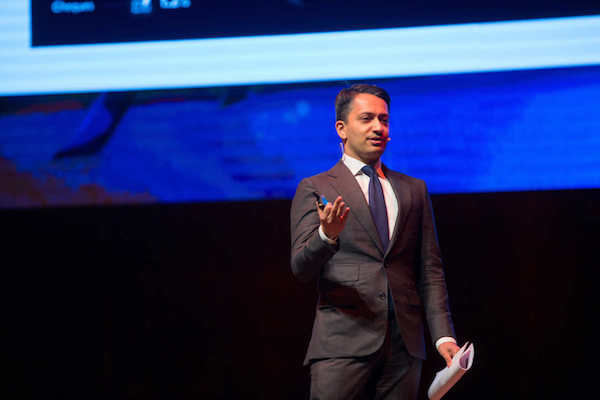Beeneet Kothari doesn’t shy away from what he calls the elephant in the room.
The renowned tech investor, who runs the $US2.5 billion ($3.3 billion) technology investment fund Tekne Capital Management, is a favourite of the Sohn Hearts & Minds conference, having delivered a series of stunning stock tips. But 2020’s pick, Hong Kong-listed payments firm Yeahka, has been caught up in the broad sell-off of Chinese tech stocks.

“It’s been a bloodbath,” Kothari says of the rout in Chinese shares from his office in New York, before his return to the Hearts & Minds conference in December.
Although Kothari also emphasises that Tekne’s broader focus on emerging market tech stocks has paid off this year, nominating Singaporean group Sea Limited (up 81 per cent this year) and Indian giant Reliance (up 32 per cent) as top performers, China has been tough and Yeahka’s trajectory sums up what’s happened to the broader sector.
Between last year’s conference in November and mid-February, the stock more than tripled in value. But the regulatory crackdown unleashed from Beijing had it give up all its gains and more, and the stock is down 44 per cent over the past 12 months.
Happily for investors in the listed investment company set up to trade on tips made at the Australian Sohn conference, called Hearts & Minds Investments, the LIC sold out of Yeahka in early 2021, locking in a 112 per cent return.
Kothari is undaunted by Yeahka’s fall. He remains invested in the stock and has increased his exposure to China over the course of this year for two reasons.
Regulatory changes
First, he believes at least some of the regulatory changes announced are actually good for the long-term health of the Chinese economy. The sudden shuttering of the for-profit education sector, for example, should make it more affordable to raise children, which in turn encourages population growth that will help GDP growth over time.
Second, he says the regulatory crackdown is partly driven by political posturing leading into next October’s Communist Party Congress.
“In other words, it won’t have as much bite as the market fears,” he says.
Tekne expects the crackdown will be done at least by October 2022, if not earlier. If the Chinese government allows Alibaba subsidiary Ant Financial to finally proceed with its IPO early next year – which Kothari says is possible – it will be a signal the government is easing the pressure on the tech sector.
“We’ve got a calendar of events that we’re watching between now and October of next year, and as some of these events start happening, we’re going to get pretty excited about China again. We probably own more shares of all of our Chinese companies than we did a year ago when the stocks were much higher.”
— Beeneet Kothari
The regulatory pressure on US tech stocks is less of a concern to the fund manager. Not only is it limited to a handful of companies but also regulators are hamstrung by America’s short electoral cycles, Kothari says.
“All Jeff Bezos had to do was just outlast Donald Trump in office. And he did, and no one talks about Amazon any more.”
More than this though, Kothari says the relationship between the tech sector and governments might be the biggest change to come out of the pandemic.
“In my opinion, jobs are the only shared language between politicians and bureaucrats and the for-profit sector.
“Up until that moment, technology and governments globally were sort of butting heads, but I think last year was a reminder that these tech companies are really quite critical, not just because they allow us to communicate when other methods of doing business are unavailable, but they create jobs.
“Technology’s not just for four guys in a room that can create a piece of software to service the whole world, it’s real people.”
Dominant asset
Another area with its own regulatory issues that has Kothari excited is crypto, but he’s quick to define that enthusiasm. Although DeFi (decentralised finance) has emerged as crypto’s hottest subsector this year, Kothari says the area remains at the very early stages of its development and his focus is on bitcoin, which was trading around $60,000 over the weekend, having hit a record high last week.
“To me, it’s just such a dominant, dominant asset. This is now year 13. It’s been tested. It’s hacker-proof. And it’s now got the endorsement of not just important people, but important institutions, important companies, and now some countries.”
Where Kothari is less enthusiastic is around the avalanche of alternative stablecoins and tokens seen in the last year.
“The reason a lot of these coins or tokens exist is to basically transfer value between people. So that value is kind of like an incentive to work on a project, the shared mission.
“But what I scratch my head about every day is why do we need something to create value when we’ve got bitcoin? In other words, we already have a token that’s decentralised, that’s large ... that’s secure. You don’t have to do anything. It’s there. And now you can just develop your ecosystem on top of it.
“Today, probably the average interested person could explain bitcoin. I think the average crypto investor couldn’t explain 99 per cent of these tokens that exist out there. Myself included.”
Perhaps the biggest immediate issue facing technology investors is the prospect that inflation, interest rates and bond yields could all go higher, putting pressure on tech stocks with high valuations.
This article was originally posted by The AFR here.
Licensed by Copyright Agency. You must not copy this work without permission.